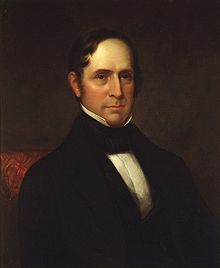Willie Person Mangum
| Willie Person Mangum | |
|---|---|

Portrait by James Reid Lambdin
|
|
| President pro tempore of the United States Senate | |
|
In office May 31, 1842 – March 3, 1845 |
|
| President | John Tyler |
| Preceded by | Samuel L. Southard |
| Succeeded by | Ambrose Hundley Sevier |
|
United States Senator from North Carolina |
|
|
In office March 4, 1831 – November 26, 1836 |
|
| Preceded by | Bedford Brown |
| Succeeded by | David S. Reid |
|
In office November 25, 1840 – March 3, 1853 |
|
| Preceded by | James Iredell, Jr. |
| Succeeded by | Robert Strange |
| Member of the U.S. House of Representatives from North Carolina's 8th district |
|
|
In office March 4, 1823 – March 18, 1826 |
|
| Preceded by | Josiah Crudup |
| Succeeded by | Daniel L. Barringer |
| Personal details | |
| Born |
May 10, 1792 Durham County, North Carolina |
| Died | September 7, 1861 (aged 69) Durham County, North Carolina |
| Political party |
Democratic (pre-1834) Whig (1834-1852) American (post-1856) |
| Spouse(s) | Charity Cain Mangum |
| Children | Catherine Davis Mangum Mary Sutherland Mangum William Preston Mangum Jr. Sally Alston Leach Martha Person Mangum |
| Alma mater | University of North Carolina at Chapel Hill |
| Profession | Law |
Willie Person Mangum (pronounced Wylie Parson; May 10, 1792 – September 7, 1861) was a U.S. Senator from the state of North Carolina between 1831 and 1836 and between 1840 and 1853. He was one of the founders and leading members of the Whig party, and was a candidate for president in 1836 as part of the unsuccessful Whig strategy to defeat Martin Van Buren by running four candidates with local appeal in different regions of the country. He is, as of 2017, the only major-party presidential nominee to have been a North Carolinian at the time of his nomination.
Mangum was born in Durham County, North Carolina (then part of Orange County), to a family of the planter class. He was the son of Catherine (Davis) and William Person Mangum. In his youth, he attended the respected private school in Raleigh run by John Chavis, a free black. They remained friends for years and had a long correspondence. He graduated from the University of North Carolina in 1815.
Mangum began a law practice and entered politics. He was elected to the United States House of Representatives, serving from 1823 to 1826. After an interlude as a superior court judge, he was elected by the legislature as a Democrat to the Senate from North Carolina in 1830.
Mangum's stay in the Democratic Party was short. He opposed President Andrew Jackson on most of the major issues of the day, including the protective tariff, nullification, and the Bank of the United States. In 1834, Mangum openly declared himself to be a "Whig", and two years later, he resigned his Senate seat.
...
Wikipedia
